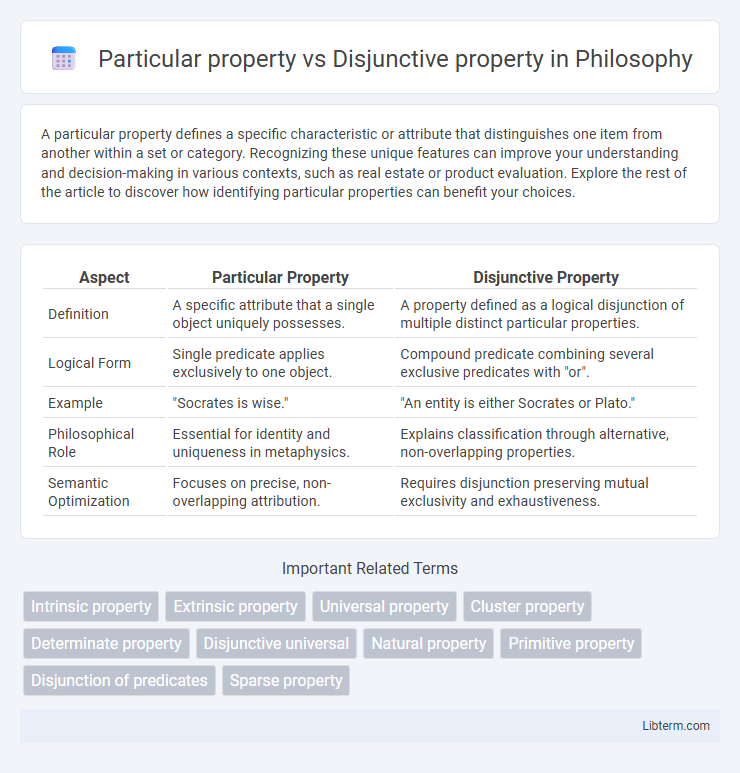A particular property defines a specific characteristic or attribute that distinguishes one item from another within a set or category. Recognizing these unique features can improve your understanding and decision-making in various contexts, such as real estate or product evaluation. Explore the rest of the article to discover how identifying particular properties can benefit your choices.
Table of Comparison
| Aspect | Particular Property | Disjunctive Property |
|---|---|---|
| Definition | A specific attribute that a single object uniquely possesses. | A property defined as a logical disjunction of multiple distinct particular properties. |
| Logical Form | Single predicate applies exclusively to one object. | Compound predicate combining several exclusive predicates with "or". |
| Example | "Socrates is wise." | "An entity is either Socrates or Plato." |
| Philosophical Role | Essential for identity and uniqueness in metaphysics. | Explains classification through alternative, non-overlapping properties. |
| Semantic Optimization | Focuses on precise, non-overlapping attribution. | Requires disjunction preserving mutual exclusivity and exhaustiveness. |
Understanding Particular Properties
Particular properties refer to attributes that apply exclusively to specific individuals or singular entities, distinguishing them from general or universal traits. Understanding particular properties involves recognizing their role in defining unique characteristics that cannot be shared broadly across a category. This concept is crucial in fields like metaphysics and ontology, where clarifying individual identity depends on identifying these singular properties.
Defining Disjunctive Properties
Disjunctive properties are defined by the presence of at least one constituent property from a specific set, where an entity satisfies the property if it meets any one of the alternative conditions. This contrasts with particular properties, which apply to a single, distinct characteristic or condition exclusively. Disjunctive properties enable broader classification frameworks by allowing entities to be grouped based on multiple mutually exclusive traits.
Key Differences Between Particular and Disjunctive Properties
Particular property refers to a characteristic or attribute that applies exclusively to individual instances within a set, whereas disjunctive property denotes a condition where an entity possesses one or more mutually exclusive traits from a defined group. The key difference lies in specificity: particular properties are unique to singular elements, while disjunctive properties span multiple potential attributes that cannot coexist simultaneously. Understanding these distinctions is crucial for semantic modeling and logical classification in fields like ontology design and knowledge representation.
Examples of Particular Properties
Particular properties refer to characteristics or attributes that pertain to specific individuals or instances, such as "being the tallest building in New York" or "having a unique fingerprint pattern." An example of a particular property is the property of "being the capital city of France," which applies uniquely to Paris. These properties contrast with disjunctive properties, which involve logical combinations of multiple properties, such as "being red or blue.
Examples of Disjunctive Properties
Disjunctive properties are characterized by presenting multiple, distinct options or values for a given attribute, such as a property indicating "color" that can be either red, blue, or green. An example includes RDF predicates where a property might link to a literal representing either a date or a string, reflecting alternative data types. This contrasts with particular properties, which specify a single, unique value for an attribute without alternatives.
Philosophical Significance of Particular Properties
Particular properties refer to unique, non-repeatable features tied to specific individual entities, shaping their distinct identity within metaphysical frameworks. These properties challenge classical universals by emphasizing singularity and the concrete existence of objects, influencing debates on the nature of reality and individuation. The philosophical significance lies in their role in grounding a robust ontology that accounts for the uniqueness of objects beyond abstract categorizations.
The Role of Disjunctive Properties in Metaphysics
Disjunctive properties in metaphysics refer to properties that an object possesses if it has at least one property from a specified set, contrasting with particular properties which an object exclusively exemplifies. The role of disjunctive properties is crucial for understanding the complexity of objects with multiple potential states or conditions, allowing metaphysicians to analyze phenomena involving alternative possibilities without committing to a singular, exclusive property. This framework facilitates discussions on modality, identity, and the nature of property instantiation in complex or ambiguous cases.
Criticisms of Disjunctive Properties
Disjunctive properties combine two or more distinct properties into a single category, often criticized for their lack of coherence and explanatory power in metaphysics. Critics argue that disjunctive properties fail to provide genuine unifying features, making them ontologically inflated and epistemically problematic for scientific and philosophical analyses. This criticism contrasts with particular properties, which are seen as more concrete and specific, aiding clarity and precision in property theory.
Implications for Property Realism
Particular properties are unique to individual objects and capture their specific characteristics, while disjunctive properties combine multiple distinct attributes under a single label, often leading to less precise classification. Property realism, which asserts that properties exist objectively and independently, faces challenges with disjunctive properties because they may obscure the true nature of properties by grouping unrelated features. Emphasizing particular properties supports a more robust realism by maintaining clear, well-defined attributes that correspond directly to the object's inherent qualities.
Comparative Analysis: Applications and Limitations
Particular properties specify a unique attribute or value applied to an individual entity, while disjunctive properties allow for multiple, alternative values or attributes within a set. Across applications, particular properties excel in precise data modeling, such as defining specific characteristics of a product, whereas disjunctive properties are advantageous in scenarios demanding flexibility, like representing user preferences or categorical options. Limitations arise as particular properties can be overly restrictive, hindering adaptability, whereas disjunctive properties may introduce ambiguity and complexity in data querying and management.
Particular property Infographic

 libterm.com
libterm.com